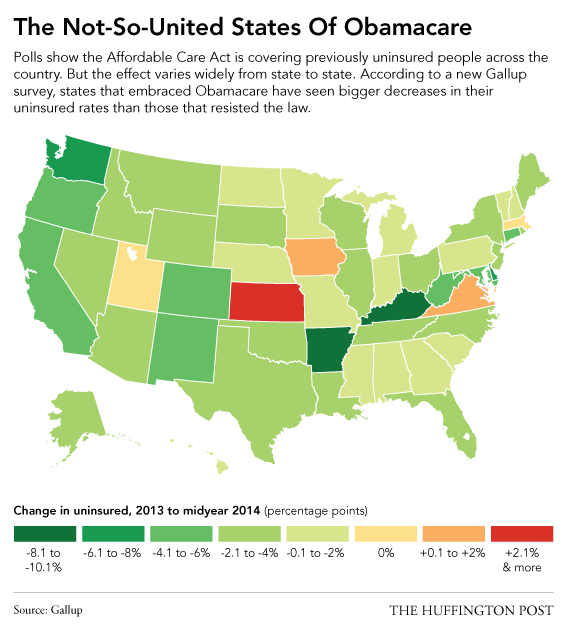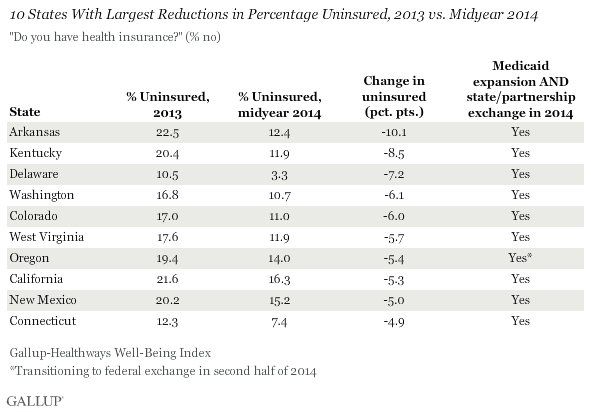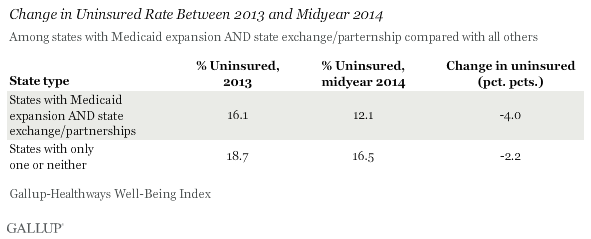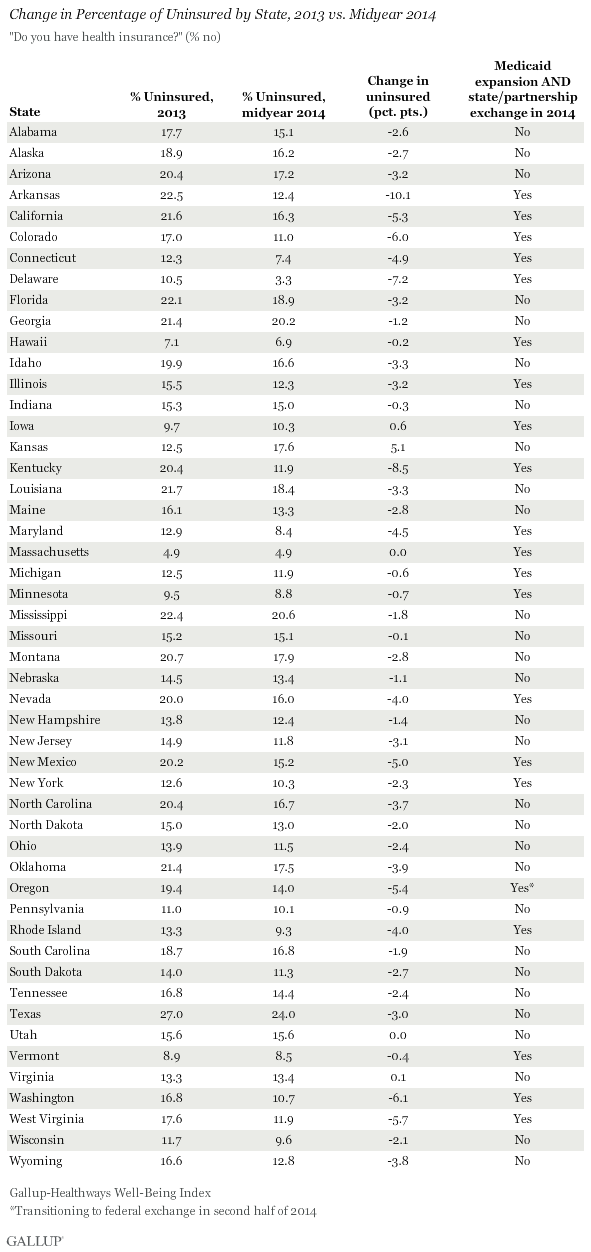Obamacare's Impact on the Uninsured, State by State
Where officials wanted it to work, it did
Where officials wanted it to work, it did
Obamacare is already making a big difference in the states that actually embraced it.
States that expanded Medicaid and created their own health insurance exchanges, or worked closely with the federal government to cover more people, have shown the largest drops in their uninsured rates this year, according to a new poll released by Gallup and Healthways on Tuesday.
Leading the pack was Arkansas, where the uninsured rate has fallen by 10.1 percentage points so far this year, and Kentucky, where it has fallen 8.5 percentage points.
Multiple surveys and studies conducted since the first Affordable Care Act sign-up period officially ended on March 31 suggest President Barack Obama's signature health care reform law is succeeding in one of its chief aims: extending coverage to Americans who lacked health insurance.
The Gallup poll underscores the crucial role played by states, which varied in their approach to Obamacare from fully cooperating with its implementation to actively obstructing it. States have the option of establishing their own insurance exchanges, partnering with the federal government or deferring entirely to the Department of Health and Human Services. States also have a choice between accepting federal dollars to make Medicaid available to more of their poorest residents or rejecting the funding.
The results of those decisions are clear. States that welcomed the law saw significant drops in their uninsured rate, according to Gallup. The findings are consistent with other recent research showing the uninsured rate barely moved in states that didn't expand Medicaid.
The uninsured rate fell 10.1 percentage points to 12.4 percent as of June 30 in Arkansas, which broadened Medicaid eligibility through its "private option" plan using private insurance companies and teamed up with the federal government on an insurance exchange. Kentucky, which has its own exchange and expanded Medicaid, saw its uninsured rate drop 8.5 percentage points, to 11.9 percent. And in Delaware, which also expanded Medicaid and has a partnership exchange, the uninsured rate fell from 10.5 percent to 3.3 percent, Gallup found.
Washington state, Colorado, West Virginia, Oregon, California and New Mexico each cut their uninsured rates by at least 5 percentage points, and Connecticut's fell 4.9 percentage points.

Overall, the uninsured rate fell 4 percent in states that expanded Medicaid and either set up an exchange or partnered with the federal government, compared with 2.2 percent in states that did neither, Gallup found.
The nationwide uninsured rate is 13.4 percent, the lowest since 2008, Gallup reported in a separate survey last month. HHS estimates that thanks to Obamacare, more than 10 million more people are now covered by private health insurance, Medicaid or the Children's Health Insurance Program than before.
Even without expanding Medicaid, the uninsured rate still fell at least slightly in most states that didn't help with Obamacare, according to the Gallup poll. This likely is due in large part to the availability of subsidized private health insurance via the exchanges for people earning more than the federal poverty level, which was $11,490 for a single person during the enrollment period for this year.
For instance, several states that had higher-than-average uninsured rates saw declines. In Florida, the share of residents without health coverage declined 3.2 percentage points to 18.9 percent. In Texas, it dropped to 24 percent, a 3-percentage-point difference. And in Louisiana, 18.4 percent of residents are now uninsured, 3.3 percentage points lower than before Obamacare enrollment. Three states actually recorded an increase in the uninsured rate since September: Kansas, by 5.1 percentage points to 17.6 percent, Iowa, by 0.6 percentage points to 10.3 percent, and Virginia, by 0.1 percentage points to 13.4 percent Gallup found.
For 2014 enrollment, 26 states and the District of Columbia adopted the Medicaid expansion, [url="http://kff.org/health-reform/state-indicator/state-decisions-for-creating-health-insurance-exchanges-and-expanding-medicaid/]16 states and the District of Columbia[/url] fully operated exchanges, seven states opted for partnership exchanges and the remainder allowed HHS to run their exchanges. The breakdown of state and federal exchanges may be different for the enrollment period for 2015 health coverage that begins Nov. 15. For example, Idaho plans to switch to a state-run exchange, while Oregon will allow the federal government to handle enrollment.
For its study, Gallup interviewed almost 89,000 adults in all 50 states and the District of Columbia by phone. The margin of error ranges from plus or minus 1 percentage point to 3.5 percentage points in states with small populations, such as Delaware, Hawaii, North Dakota, South Dakota and Wyoming.
http://www.huffingtonpost.com/2014/08/05/states-obamacare_n_5650606.html?ncid=txtlnkusaolp00000592
Last edited:








